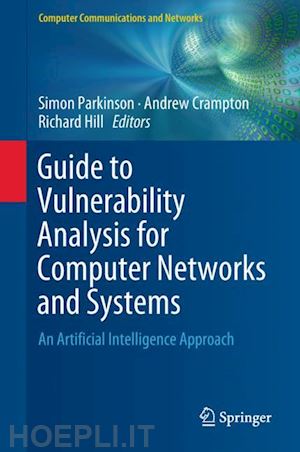
Questo prodotto usufruisce delle SPEDIZIONI GRATIS
selezionando l'opzione Corriere Veloce in fase di ordine.
Pagabile anche con Carta della cultura giovani e del merito, 18App Bonus Cultura e Carta del Docente
This professional guide and reference examines the challenges of assessing security vulnerabilities in computing infrastructure. Various aspects of vulnerability assessment are covered in detail, including recent advancements in reducing the requirement for expert knowledge through novel applications of artificial intelligence. The work also offers a series of case studies on how to develop and perform vulnerability assessment techniques using start-of-the-art intelligent mechanisms.
Topics and features: provides tutorial activities and thought-provoking questions in each chapter, together with numerous case studies; introduces the fundamentals of vulnerability assessment, and reviews the state of the art of research in this area; discusses vulnerability assessment frameworks, including frameworks for industrial control and cloud systems; examines a range of applications that make use of artificial intelligence to enhance the vulnerability assessment processes; presents visualisation techniques that can be used to assist the vulnerability assessment process.In addition to serving the needs of security practitioners and researchers, this accessible volume is also ideal for students and instructors seeking a primer on artificial intelligence for vulnerability assessment, or a supplementary text for courses on computer security, networking, and artificial intelligence.
Part I: Introduction and State of the Art
Review of the State of the Art of Vulnerability Assessment Using Artificial Intelligence
Saad Khan and Simon Parkinson
A Survey of Machine Learning Algorithms and Their Application in Information Security
Mark Stamp
Part II: Vulnerability Assessment Frameworks
Vulnerability Assessment of Cybersecurity for SCADA Systems
Kyle Coffey, Leandros A. Maglaras, Richard Smith, Helge Janicke, Mohamed Amine Ferrag, Abdelouahid Derhab, Mithun Mukherjee, Stylianos Rallis, and Awais Yousaf
A Predictive Model for Risk and Trust Assessment in Cloud Computing: Taxonomy and Analysis for Attack Pattern Detection
Alexandros Chrysikos and Stephen McGuire
AI and Metrics-Based Vulnerability-Centric Cyber Security Assessment and Countermeasure Selection
Igor Kotenko, Elena Doynikova, Andrey Chechulin, and Andrey Fedorchenko
Artificial Intelligence Agents as Mediators of Trustless Security Systems and Distributed Computing Applications
Steven Walker-Roberts and Mohammad Hammoudeh
Part III: Applications of Artificial Intelligence
Automated Planning of Administrative Tasks Using Historic Events: a File System Case StudyDefending Against Chained Cyber-Attacks by Adversarial Agents
Vivin Paliath and Paulo Shakarian
Vulnerability Detection and Analysis in Adversarial Deep Learning
Yi Shi, Yalin E. Sagduyu, Kemal Davaslioglu, and Renato Levy
SOCIO-LENS: Spotting Unsolicited Callers Through Network Analysis
Muhammad Ajmal Azad, Junaid Arshad, and Farhan Riaz
Function Call Graphs Versus Machine Learning for Malware Detection
Deebiga Rajeswaran, Fabio Di Troia, Thomas H. Austin, and Mark Stamp
Detecting Encrypted and Polymorphic Malware Using Hidden Markov Models
Dhiviya Dhanasekar, Fabio Di Troia, Katerina Potika, and Mark Stamp
Masquerade Detection on Mobile Devices
Swathi Nambiar Kadala Manikoth, Fabio Di Troia, and Mark Stamp
Identifying File Interaction Patterns in Ransomware Behaviour
Liam Grant and Simon Parkinson
Part IV: Visualisation
A Framework for the Visualisation of Cyber Security Requirements and its Application in BPMN
Bo Zhou, Curtis Maines, Stephen Tang, and Qi Shi
Big Data and Cyber Security: A Visual Analytics Perspective
Suvodeep Mazumdar and Jing Wang
Dr. Simon Parkinson is a Senior Lecturer in Computer Science in the School of Computing and Engineering, University of Huddersfield, UK.
Prof. Andrew Crampton is a Professor of Computational Mathematics in the School of Computing and Engineering, and the Associate Dean for Teaching and Learning at the University of Huddersfield.
Prof. Richard Hill is a Professor of Intelligent Systems, the Head of the Department of Informatics, and the Director of the Centre for Industrial Analytics at the University of Huddersfield. His other publications include the successful Springer titles Guide to Security Assurance for Cloud Computing, Big-Data Analytics and Cloud Computing, Guide to Cloud Computing, and Cloud Computing for Enterprise Architectures.











Il sito utilizza cookie ed altri strumenti di tracciamento che raccolgono informazioni dal dispositivo dell’utente. Oltre ai cookie tecnici ed analitici aggregati, strettamente necessari per il funzionamento di questo sito web, previo consenso dell’utente possono essere installati cookie di profilazione e marketing e cookie dei social media. Cliccando su “Accetto tutti i cookie” saranno attivate tutte le categorie di cookie. Per accettare solo deterninate categorie di cookie, cliccare invece su “Impostazioni cookie”. Chiudendo il banner o continuando a navigare saranno installati solo cookie tecnici. Per maggiori dettagli, consultare la Cookie Policy.